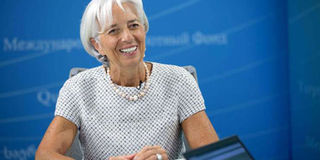Global Africa: The perils of living ‘Under the Dome’

International Monetary Fund Managing Director Christine Lagarde answers questions during a press conference at IMF Headquarters in Washington, DC, on July 29, 2015. As the International Monetary Fund puts it, “When China sneezes, Africa catches a cold.’’ PHOTO | AFP
What you need to know:
- Nairobi is a fast-emerging global city, woven into the economic fabric of the Indian Ocean Rim and a portal to Africa and the world.
- Major oil producers do not base investment decisions on short-term price fluctuations, we tell ourselves, confident that this time will be no different.
- Considering that China accounts for a third of Africa’s export growth since 2005, it is easy to project that trade will suffer across the continent.
In the American TV mini-drama Under the Dome, a transparent yet impenetrable bubble materialises one morning over a small town in Maine, in the northeast corner of the United States.
No one can enter or leave. Nothing can pass through save air and sunlight.
At first, the inhabitants of fictional Chester Mills go about their lives, almost oblivious to the challenge that will increasingly circumscribe their lives — and, in time, imperil them.
Living in Kenya, it is a tempting metaphor. Nairobi is a fast-emerging global city, woven into the economic fabric of the Indian Ocean Rim and a portal to Africa and the world.
Yet often it seems as though we live under a dome.
We are not oblivious to outside events; but generally we do not pause to fully consider what they mean for us. For a country whose destiny disproportionately depends on what happens elsewhere, that can be dangerous.
GLOBAL CHALLENGES
Right now, we face a storm of global challenges that will shake Africa, including Kenya.
The first is oil. For now, slumping prices have meant lower fuel costs — good news for consumers and companies dependent on imports, but bad for Kenya’s prospects as a future energy power.
Major oil producers do not base investment decisions on short-term price fluctuations, we tell ourselves, confident that this time will be no different.
Prices will eventually rebound. Reserves in Turkana and elsewhere will be commercially viable. Oil will soon flow from Uganda to Lamu and beyond, filling Kenya’s depleted Treasury.
Sorry, folks. It is a pipe dream. Experts agree that oil prices would need to rise above $75 a barrel to proceed with projects in Kenya.
Right now, they hover around $50. Is that a short-term low, or a long-term average?
So consider this. In the early 1980s, mid-way between a global oil boom and bust, much as we are now, Saudi Arabia calculated that it could charge roughly $25 per barrel for its oil over the coming decades.
WHEN CHINA SNEEZES.....
What would that be today, adjusted for inflation? About $62. In other words, what we see today is more or less what we will get tomorrow.
Small wonder that the leading Chinese seismic exploration company has all but ceased operations, or that Tullow Oil and others have serious second thoughts about Kenya’s energy prospects.
The second reality tapping on our “dome” but not fully penetrating is China. Put aside speculation about its stock market and currency.
The truth is that the world’s second largest economy is entering a new era of slower growth and greater financial uncertainty.
Who will suffer most? As the International Monetary Fund puts it, “When China sneezes, Africa catches a cold.’’
In Zambia, copper mines are closing, hammering export revenues and driving down the kwacha by 30 per cent.
We are seeing similar commodity-driven after-shocks from Nigeria and Ghana to Angola and South Africa.
Considering that China accounts for a third of Africa’s export growth since 2005, it is easy to project that trade will suffer across the continent.
STRONG PARTNERSHIPS
What of all those eye-catching infrastructural development projects financed by China, from Ethiopia’s new commuter train and African Union headquarters to dams, sports stadiums and highways across East Africa?
Such investments in economic diplomacy will be cut last. But as Beijing eats into its reserves to maintain growth and social peace at home, those too could eventually suffer.
Third and last is the drama playing across our screens every day — Europe’s migration crisis. In a part of the world that has seen more than its share of far larger humanitarian catastrophes, this might seem almost unimportant.
Think again. Europe’s immigration woes will not only be diplomatically painful but financially weighty, likely forcing cutbacks elsewhere.
Beneficiaries of European development assistance — Kenya among them — should be prepared.
The final episode of Under the Dome came last week. After much tribulation, the good citizens of Chester Mills faced the surrounding challenges and, with understanding and careful planning, overcame them.
The best protection against what some call the “oil curse”, for instance, is the diversified economy that Kenya already enjoys.
The China threat is best countered with strong partnerships elsewhere.




